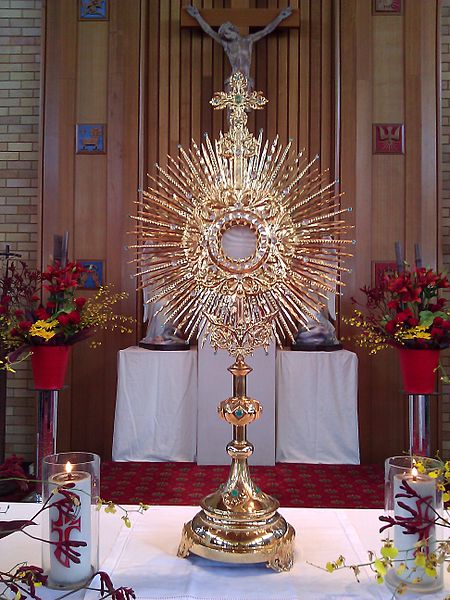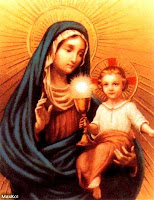Eucharistic Reflection - Hasten There From Your Home!
 |
| (Source: Wikimedia Commons) |
AFTER the
Sacrifice of the Mass and the reception of Holy Communion, visiting the Blessed
Sacrament is one of the richest sources of grace for souls. The memorable words
of Pope St. Pius X, the Pope of the Eucharist, show us clearly how he regarded such
visits: "The daily adoration or visit to the Blessed Sacrament is the
practice which is the fountainhead of all devotional works." In these
daily visits, therefore, St. Pius X recognized the root of Eucharistic
devotions.
By daily visiting the Blessed Sacrament,
we follow the footsteps of the first Christians. In the catacombs were
frequently found representations of the shepherds and the Magi kneeling before
the Infant Jesus. Animated by the living faith that Jesus is present in the
Eucharist, with Divinity and Humanity, with Body and Soul, with Flesh and
Blood, these early Christians said with the shepherds, "Let us go to Bethlehem"; with the
Magi, "falling down they adored him." (Matt. 2:11).
In the first
ages of the Church, as Justin, Tertullian and other spiritual writers relate,
the faithful were permitted to take the Sacred Hosts with them to their homes,
so that if captured for martyrdom, they might yet communicate. Even on their
journeys these faithful Christians did not wish to be separated from their
Lord, and for this reason they carried the Holy Eucharist with them, so that,
although far from a priest or church, they could still venerate the Blessed
Sacrament.
Interesting
anecdotes could be mentioned of the hermits who took the Holy Eucharist with
them into the desert. And nowadays, alas, so many Christians who live near the
church do not find a moment's time to pay a visit to their Lord! But they have
plenty of leisure for worldly visits, for useless conversations or harmful
reading.
To them apply
the words which St. John Chrysostom addressed to his people, "What excuse shall
we have, or how shall we obtain pardon, if we consider it too much to go to
Jesus, who descended from Heaven for our sake? Those foreign pagan kings
hastened thither from Persia
to see Him who lay in the manger; and thou, 0 Christian, canst thou not spare a
few moments to enjoy this heavenly spectacle?"
How we shall
regret our negligence at the hour of death! How we shall wish that we had
oftener visited our Judge who dwells in the Blessed Sacrament!
(From The Holy Eucharist Our All by Father
Lukas Etlin, O.S.B.)


.jpg)
Comments
I had never heard of this good monk. Amazing how God leads us to such spiritual nourishment! With guides like this, no wonder you love being a Benedictine. Thanks for the heads-up on the TAN book of reflections. I will add that to my list.